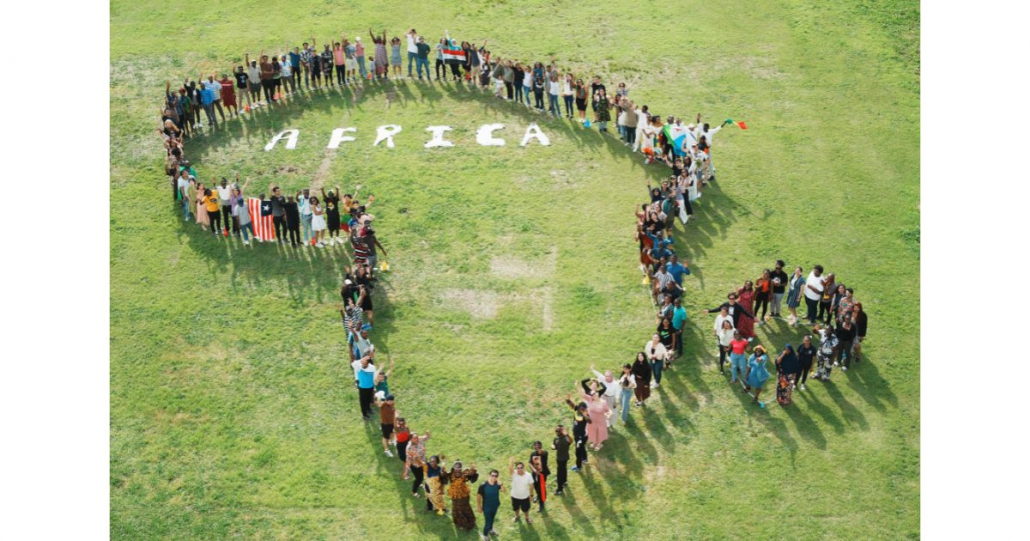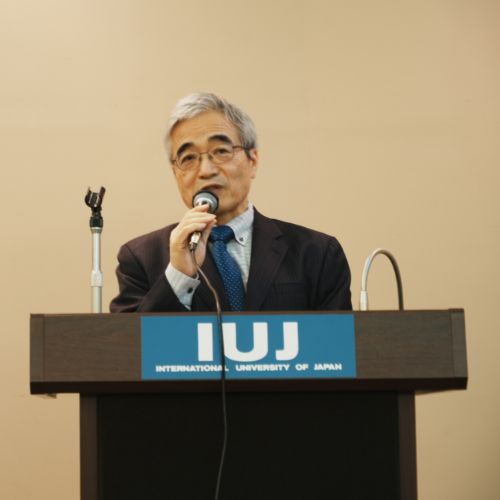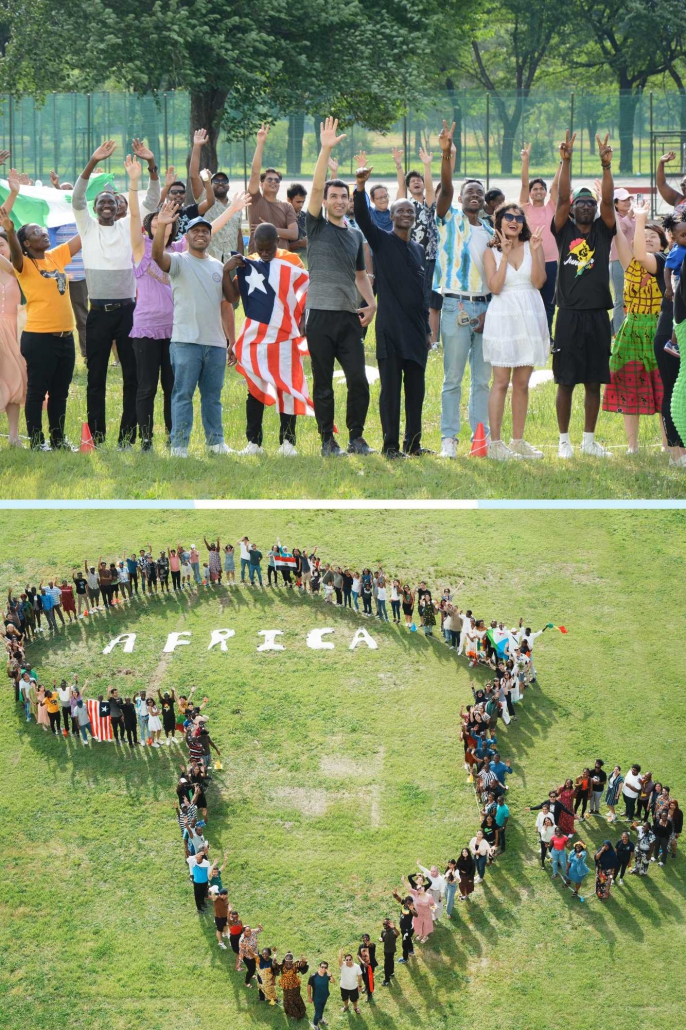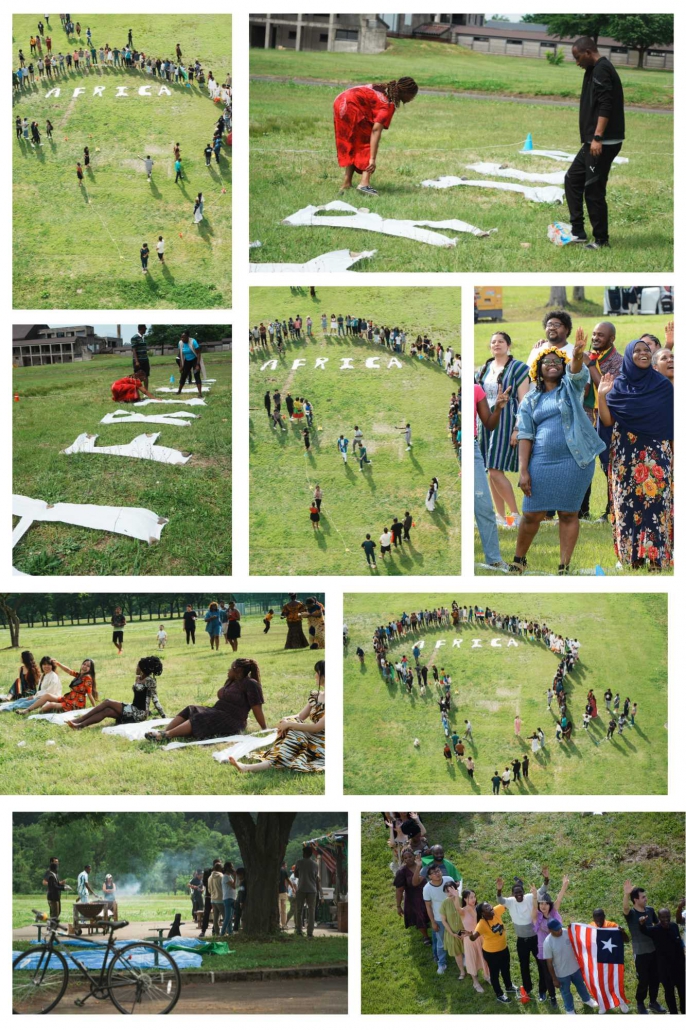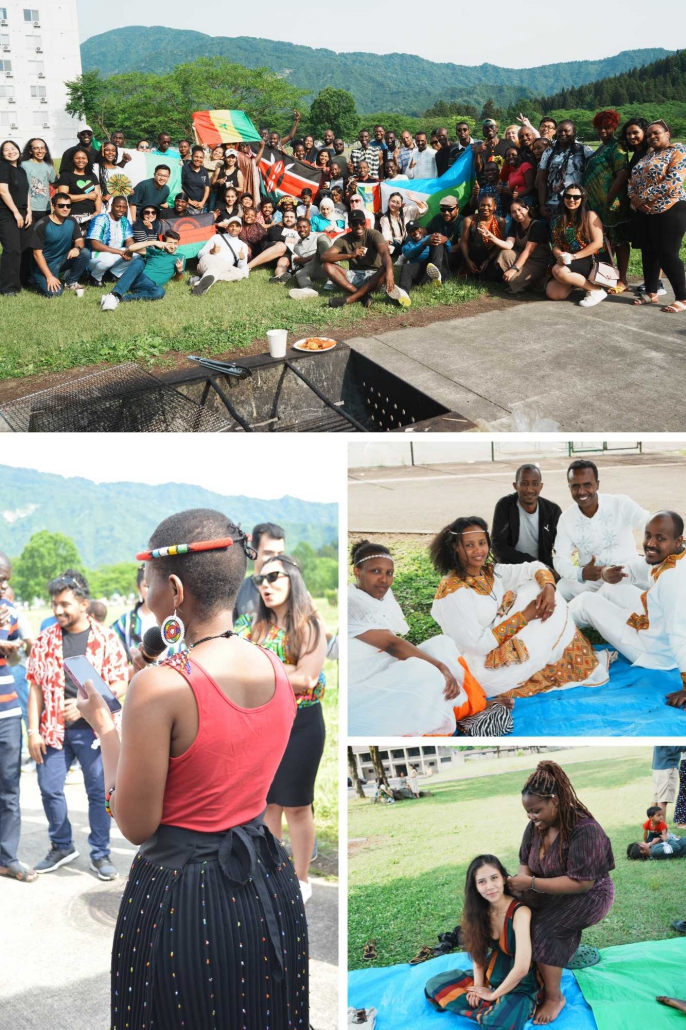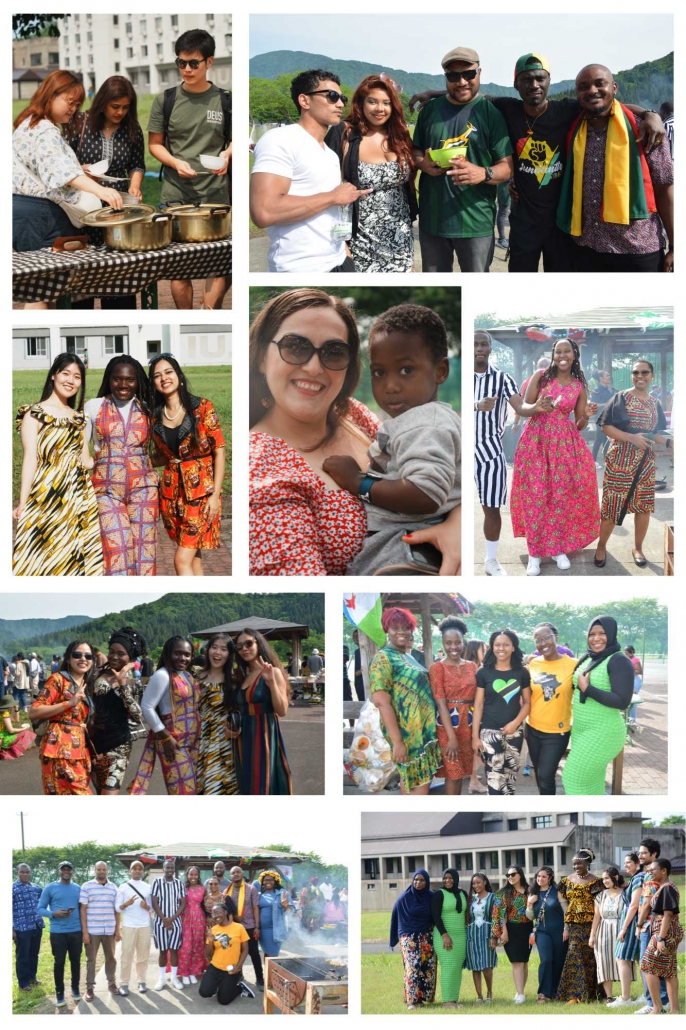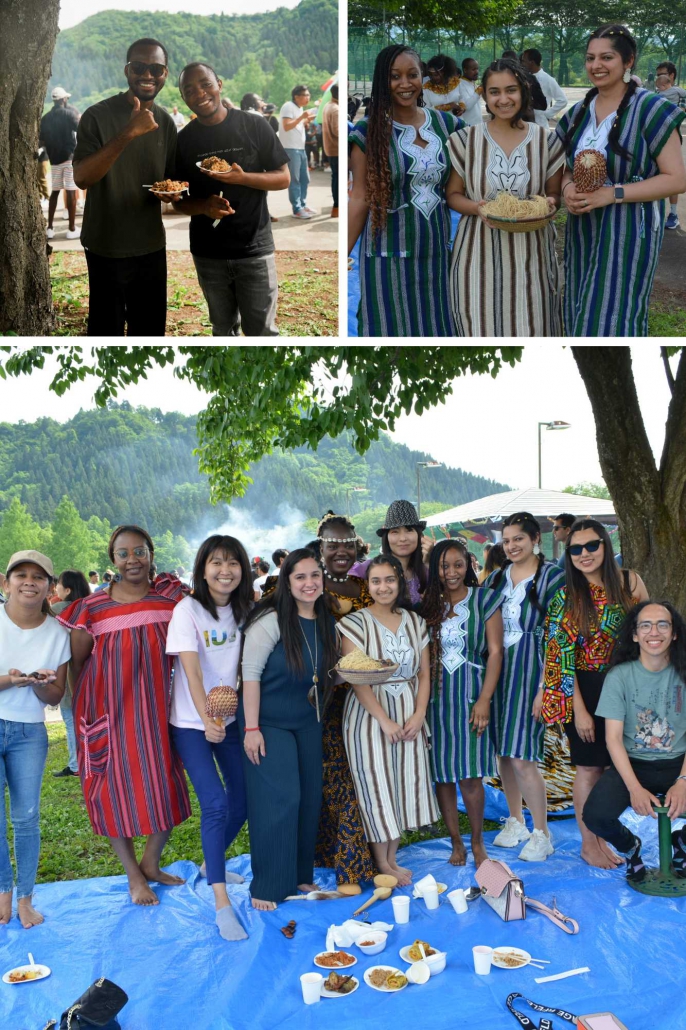IUJ African Community 2024 Organising Committee held “Africa Day”
IUJ African Community Organising Committee held “Africa Day 2024” featured two events.
The Africa Day Symposium on May 17th, 2024
Event Summary:
The Africa Day Symposium 2024, held at the International University of Japan (IUJ), was a landmark event celebrating the vibrant cultures and the progressive educational strides of African nations. The symposium brought together dignitaries, scholars, and students to discuss the theme, “Educate an African Fit for the 21st Century: Building Resilient Education Systems for Increased Access to Inclusive Lifelong Quality and Relevant Learning in Africa.
Welcome Address:
The event commenced with introduction by Mr. Olayemi Ajibola Emmanuel, the Master of Ceremony, and a welcome address by Mr. Abdulazeez Idiaro, President of the IUJ African Community. His address set the tone for the symposium, highlighting the importance of resilient educational systems to achieve the African Union’s Agenda 2063. Mr. Idiaro emphasized the need to innovate and adapt in light of challenges such as the digital divide and inadequate infrastructure, which were exacerbated by the COVID-19 pandemic. He also underscored the commitment to enhancing digital infrastructure and fostering public-private partnerships to create inclusive, equitable, and effective educational systems.
Keynote Speech:
Prof. Hiroshi Kato, Vice President of International University of Japan (and Former Vice President of JICA), delivered a keynote speech. He stressed the importance of collaboration between Asia and Africa to build a peaceful and prosperous world by the end of the 21st century. Prof. Kato’s remarks pointed out the demographic significance of Africa and Asia and the need for mutual cooperation in educational and technological advancements.
Panel Discussion 1: Building Resilient Education Systems in Africa:
Moderated by Mr. George Omiro, this session featured distinguished panelists:
▪H.E. Mrs. Genevieve Edna Apalou, The Ambassador of Ghana to Japan, represented by Mr. Christopher Gaba, The Minister Counsellor (Diaspora, Education and Culture, Embassy of Ghana, Japan)
▪Prof. Hiroshi Kato, Vice President, International University of Japan (former Vice President JICA)
▪Mr. Mochizuki Hiroshi, Senior Deputy Director, Education and Social Security Group, JICA
▪Mr. Helder Salvador Bumba, a PMPP Student at the International University of Japan
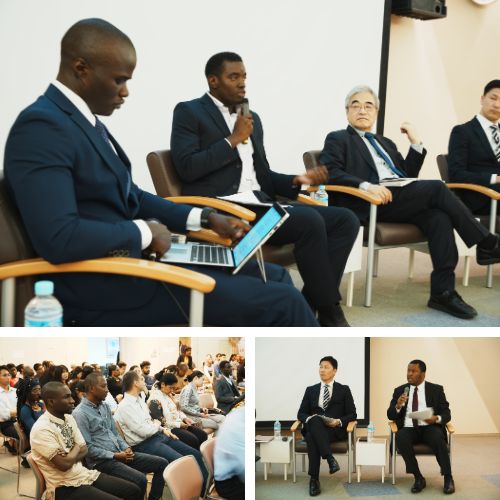 The panelists discussed strategies to ensure quality assurance in teacher education, efforts to integrate agriculture education and technology, and effective policies from other regions that could be adapted to improve educational outcomes in Africa. They also explored the shift from traditional educational practices to competency-based education programs and the importance of lifelong learning and continuous professional development for educators.
The panelists discussed strategies to ensure quality assurance in teacher education, efforts to integrate agriculture education and technology, and effective policies from other regions that could be adapted to improve educational outcomes in Africa. They also explored the shift from traditional educational practices to competency-based education programs and the importance of lifelong learning and continuous professional development for educators.
Panel Discussion 2: Innovation and Technology in Education:
Moderated by Abdulazeez Idiaro, this session included:
▪H.E. Mr. Jean Antoine Diouf, the Ambassador of Senegal to Japan
▪Mr. Hiroyoshi Noro, CEO of Divic Corp
▪Prof. Funabashi Gaku, Professor at the Graduate School of International Management, International University of Japan
▪Ms. Mtshali Mbali, International Development Program student at International University of Japan
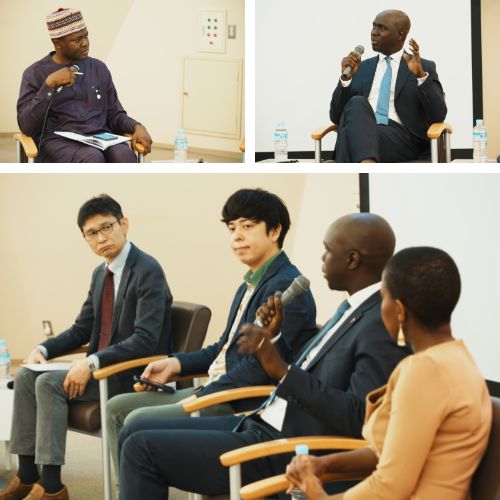
The discussion focused on innovative financing models to support educational technology, technological innovations and policies from Japan that could enhance learning in Africa, and the barriers to integrating technology in African education systems. The panelists also addressed the role of ed-tech startups, the lessons from the global shift to online learning due to COVID-19, and the importance of ensuring that technological innovations reach marginalized populations.
Key Insights and Recommendations:
1. Innovative Financing Models: Emphasis on the African Education Fund (AEF) supported by the African Development Bank to bridge the education funding gap and enhance the efficiency of education systems.
2. Technological Innovations: Adoption of ICT integration and digital literacy programs, inspired by Japan’s experience, to improve educational outcomes in Africa.
3. Addressing Barriers: Need for substantial investment in digital infrastructure and affordable internet access to overcome barriers to technology integration.
4. Role of Ed-Tech Startups: Support for ed-tech startups through funding, mentorship, and regulatory frameworks to drive educational transformation.
5. Inclusive Innovations: Developing low-cost, scalable solutions tailored to the needs of marginalized populations and collaborating with NGOs and community organizations for effective implementation.
6. Human Capacity Building: Emphasis on developing human capacity through competency-based teaching programs and practical skills training.
7. Policy and Infrastructure Alignment: Ensuring that educational policies are aligned with technological advancements and infrastructure development to support sustainable education.
8. Collaboration for Development: Encouraging collaboration between multilateral agencies, governments, and the private sector to drive educational innovation and development effectively.
Closing Remarks:
Mr Zouga Seling, the Second Secretary and Political Representative of the Kenyan Ambassador to Japan, delivered the closing remarks. He commended the IUJ African Community for organizing the symposium and highlighted the importance of African solutions to African problems, driven by data-driven approaches and inclusive glocal strategies.
Conclusion:
The Africa Day Symposium 2024 at IUJ was a resounding success, fostering insightful discussions on building resilient education systems in Africa through innovation and technology.
The Africa Day Celebration on May 26th, 2024
On the day 2 of Africa Day, colorful outdoor BBQ party was held under the refreshing early summer weather. IUJers were able to enjoy a wide variety of dishes brought in by African student volunteers. The event was lively from start to finish, especially during the games and the session in which all participants formed a map of Africa. This performance symbolized the diversity and unity of the African continent, and was a valuable opportunity for many participants to have fun together and strengthen cultural bonds. We feel that the exposure to the rich culture and traditions of Africa helped us to deepen our understanding and friendship with each other, and such an international event on the IUJ campus is a wonderful opportunity to raise awareness of multiculturalism. Events such as Africa Day are an important part of IUJ’s efforts to continue to provide a place for diverse cultures to interact as part of IUJ student life. The participants will remember this joyous occasion in their hearts and vow to continue to expand their circle of international understanding and friendship in the future.
What is Africa Day?(Referenced from Wikipedia ) —Africa Liberation Day (formerly African Freedom Day and African Liberation Day) is the annual commemoration of the foundation of the Organization of African Unity on May 25, 1963.[1] It is celebrated in various countries on the African continent as well as around the world. The organization was replaced by the African Union on July 9, 2002, but the holiday continues to be celebrated on 25 May.
===
PR Team
media@iuj.ac.jp
===

